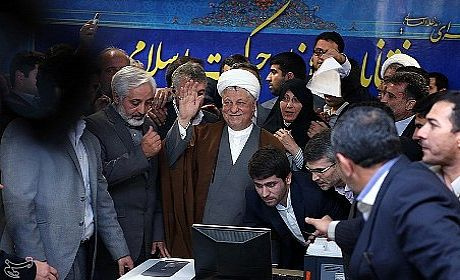Ayatollah Hashemi Rafsanjani Knows Today’s World

Today, news of Ayatollah Hashemi’s candidacy in the presidential election was published and analyzed in many newspapers around the world. Why is there so much attention given to this issue?
The question that had been raised by many western and Arab countries, like many Iranians, was whether Ayatollah Hashemi Rafsanjani would be a presidential candidate or not. The reason is, first, his impact on the political developments of the country and, second, his outlook on foreign policy. The western and Arab countries consider Hashemi Rafsanjani as one of the most significant political personalities of Iran during the past few decades. They have considered him as one of the important foundations of the Islamic Republic of Iran. On the other hand, Hashemi Rafsanjani is known in the West as a pragmatist politician.
To what extent is this view correct? What are the signs of his pragmatism?
In my opinion, this is a correct analysis. When one looks at Hashemi Rafsanjani’s record, we see that even during the 1980s, which was the first decade of the revolution and an idealistic and revolutionary atmosphere dominated the country and no one could think and speak otherwise, Hashemi Rafsanjani, with his pragmatism, attempted to solve many of the international problems Iran was faced with, particularly its relations with the US. However, these attempts were defeated when some radical and revolutionary groups revealed negotiations with McFarlane.
Later, Hashemi Rafsanjani played an important role in ending the war. This is while some people, without considering the realities of war, intended to continue the war. Knowing the existing problems, Hashemi Rafsanjani acted along this path and Imam Khomeini approved this realistic outlook and accepted Resolution 598. He actually blocked the way for those who intended to continue the war and create more problems for the country.
During his presidency, Mr. Hashemi had the same pragmatist view on foreign policy and Iran’s relations with the world and made attempts to remove the tensions in foreign policy. Due to certain problems that were created, détente with Europe did not take place, but it was enforced with the regional countries, particularly the Persian Gulf Arab states and Saudi Arabia, and relations with these countries improved.
But the détente policy was pursued during Mr. Khatami’s presidency, right?
Yes. It is true that the policy of détente manifested itself during Khatami’s presidency, but it was the continuation of Hashemi’s foreign policy. The preparations made during the Hashemi presidency made the enforcement of détente possible when Khatami was president. We saw that this policy led to the improvement of Iran’s relations with many countries of the world including the European countries. During this time, Iran’s relations with countries like France, Germany, Spain, Italy… were in their best possible state since after the revolution.
What is the West’s view with regard to Ayatollah Hashemi’s candidacy?
I assume that the West hopes that through Hashemi’s coming to power, a new outlook would dominate Iran’s foreign policy. It must be noted that during the past few years, our foreign policy has considered many countries of the world as its enemies. Some officials have a black-and-white and bipolar view of the world and claim that Iran has a historical mission to be in conflict with the West and use any opportunity to deal a blow to the US and Europe.
This is while Mr. Hashemi does not have such a view of the world and pursues interaction with the West and détente in Iran’s foreign policy. It is obvious that the western countries wish for someone to come to power in Iran who knows the language of the world and can solve their current problems with Iran. I assume that if Mr. Hashemi becomes Iran’s president, we will witness a period of détente with the West and improvement of Iran’s relations with the countries of the region and Europe.
But many believe that the president in Iran has no role in foreign policy and that there are other institutions which decide about the country’s foreign policy?
I don’t have the same interpretation. I don’t believe that all of Iran’s foreign policy decisions are made in other institutions and without the opinion of the president. Based on the constitution, the president is the highest official authority of the country after the Supreme Leader and plays a serious role in the policies of the country, especially foreign policy. I basically do not agree with the idea, proposed by some, that for example the Supreme Leader decides on issues of foreign policy by himself and without considering other institutions. Of course, based on Article 110 of the constitution, “the general policies of the Islamic Republic of Iran” are defined by the Supreme Leader. But in the same article, it is explicitly stated that the leader defines these policies after conferring with the Expediency Council. Therefore, the Supreme Leader certainly sets the general policies of the country after consulting with the legal institutions of the country, including the president, the parliament, and the National Security Council.
For example, with regard to the nuclear issues, the Supreme Leader decides after consulting with other bodies of the country and this can be seen in the differences between Iran’s nuclear policies during the Khatami and Ahmadinejad presidencies. It must be noted that the foreign policies of the country are not made in a vacuum and the president and some of the key ministers of the cabinet are present in the decision-making councils and play serious roles in them. Many of the more sensitive policies of the country, particularly with regard to foreign policy, are determined in the National Security Council. Besides the president who heads this council, the foreign minister, the interior minister and the intelligence minister are also members of this council. The enforcement of foreign policy is completely in the hands of the foreign ministry. Hence, from the aspect of setting and enforcing foreign policy, it is important who the president is.

